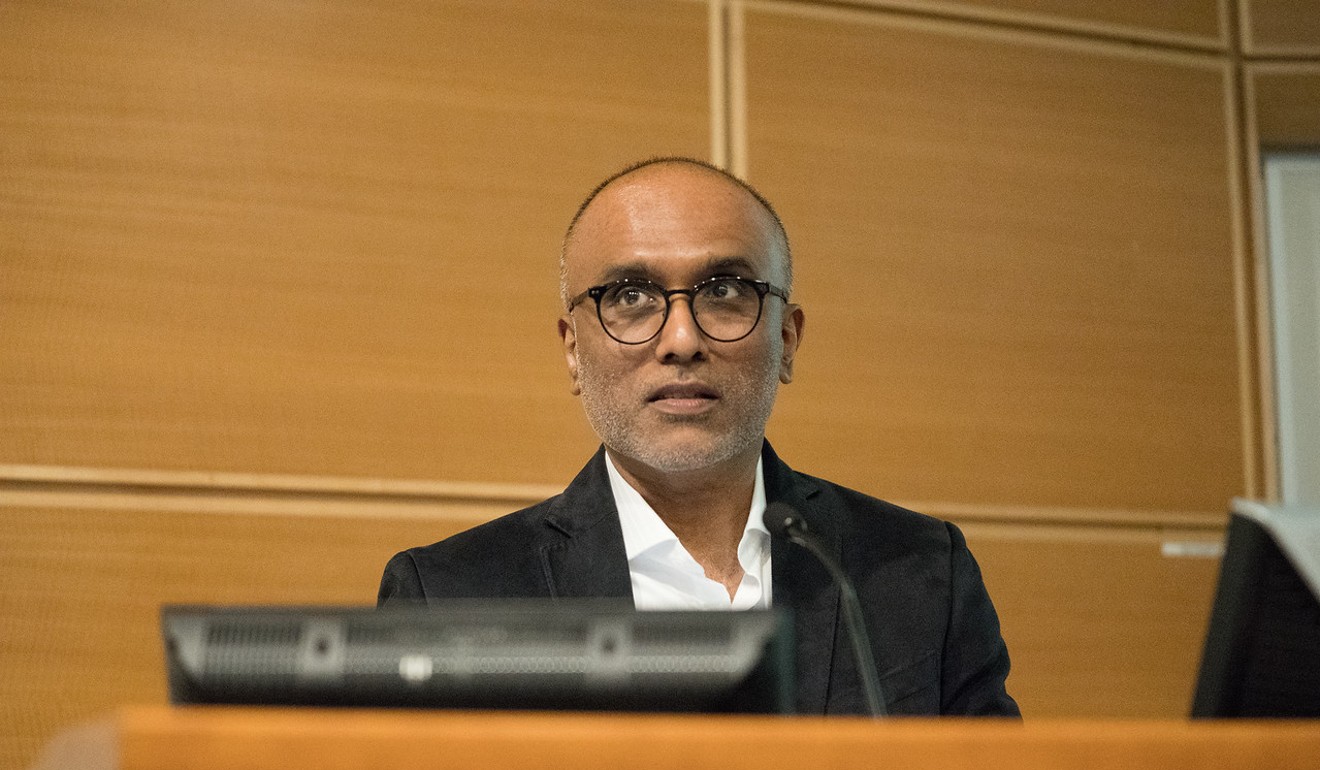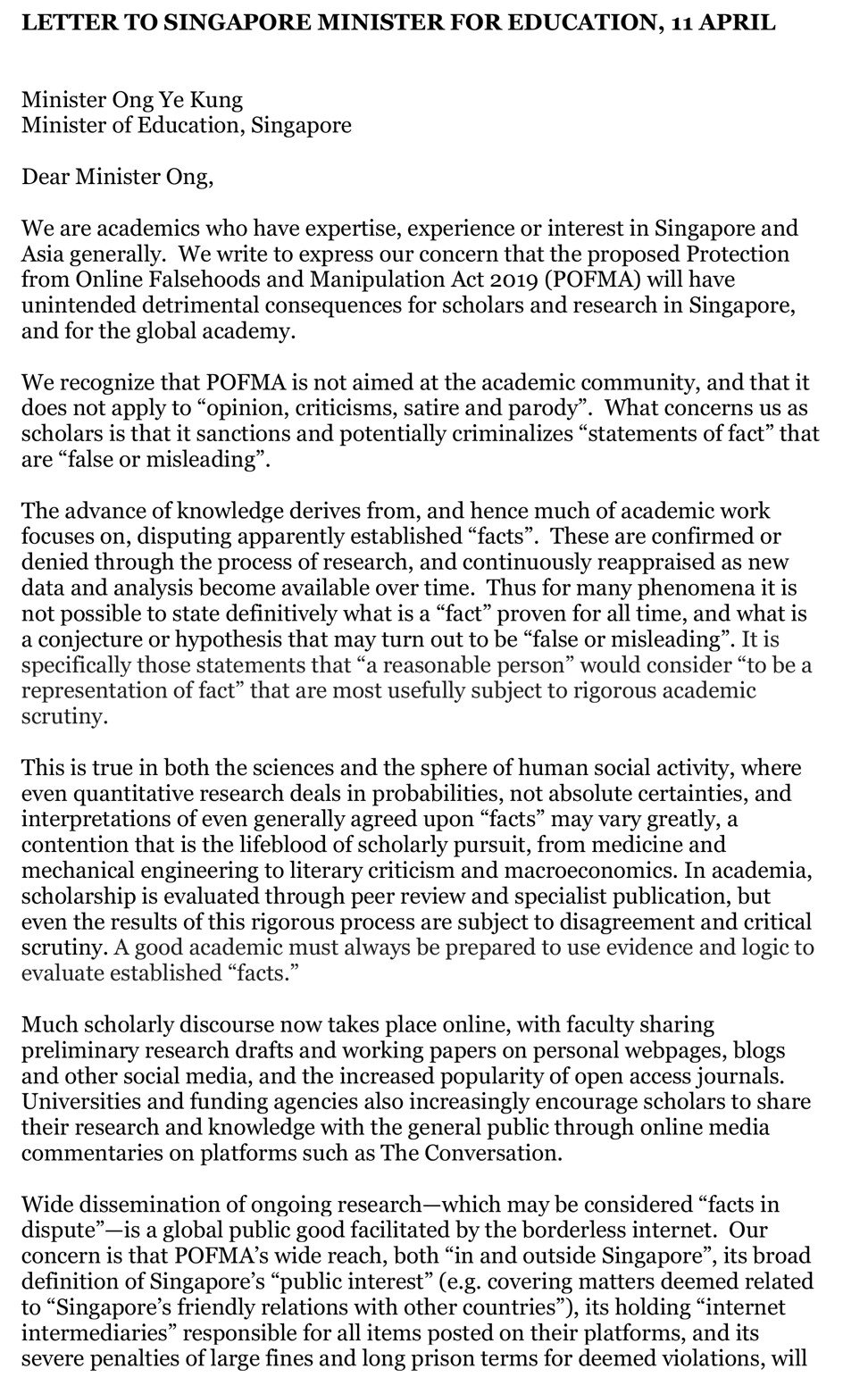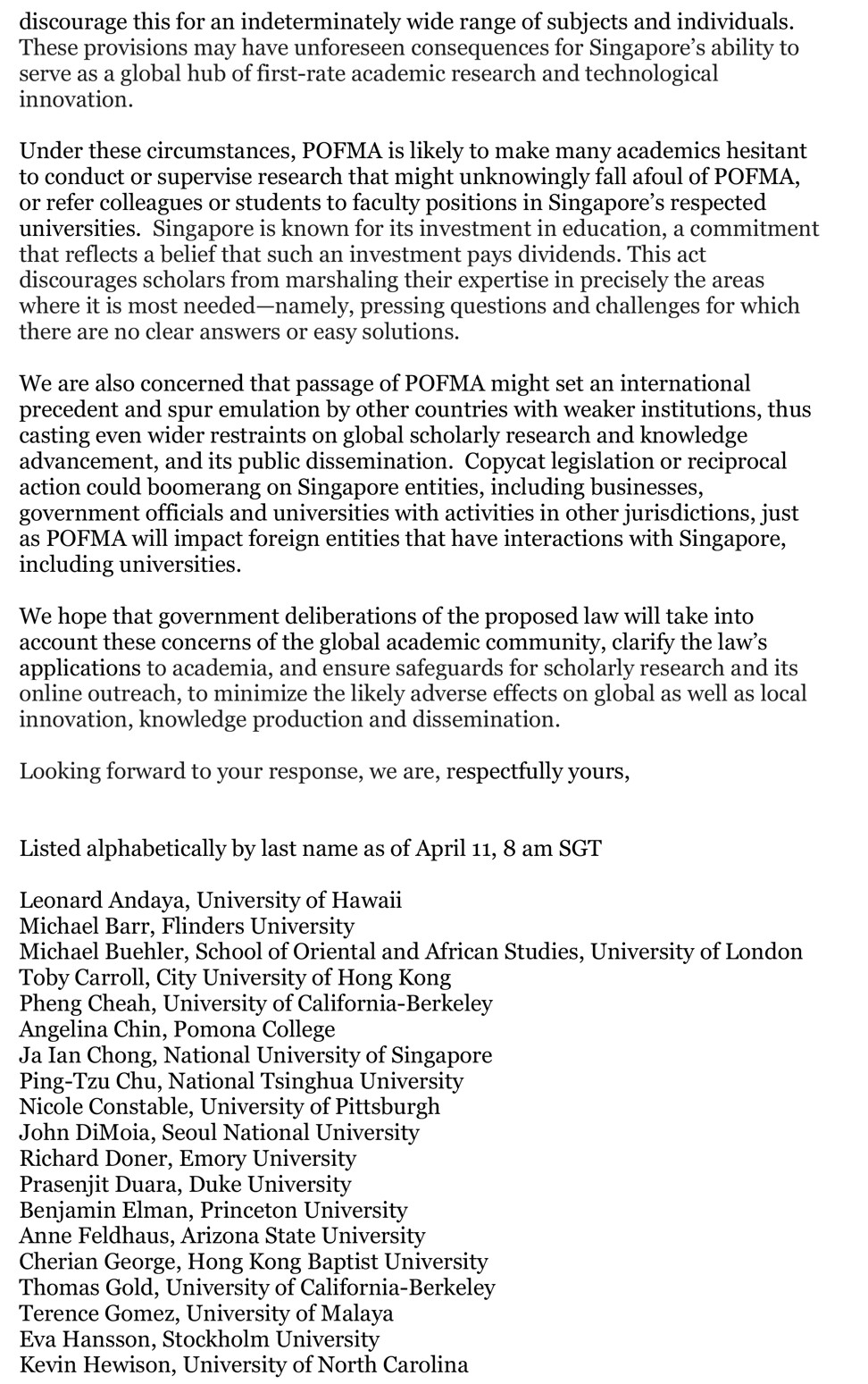
Dozens of university dons concerned Singapore’s anti-fake news laws will stifle academic freedom
- Writers of letter to government took issue with penalties proposed in new bill, noting they would affect students in ‘an indeterminately wide range of subjects’
- Tabled in parliament on April 1, the bill has raised eyebrows for the sweeping powers it would hand the government.
Over 80 academics from around the world have written to the Singapore government expressing concerns over how recently proposed laws against online falsehoods could threaten academic freedom in the city state.
The Protection From Online Falsehoods and Manipulation Bill, tabled in parliament on April 1, has raised eyebrows for the sweeping powers it would hand the government.
In their letter, sent to Singapore’s education minister on April 11 and made available to the media on April 13, the academics focused on how the proposed powers to police falsehoods could backfire on researchers. “The legislation may also set negative precedents, with knock-on effects on the global academy,” wrote the academics.
They noted that much of academic work focuses on disputing apparently established “facts”, which are confirmed or denied through research, and continuously reappraised as new data becomes available.
Singapore introduces anti-fake news law to counter falsehoods aimed at ‘exploiting’ the city’s ‘fault lines’
“Thus for many phenomena it is not possible to state definitively what is a ‘fact’ proven for all time, and what is a conjecture or hypothesis that may turn out to be ‘false or misleading’,” wrote the group of scholars, who include University of Michigan business professor Linda Lim, Baptist University journalism professor Cherian George, National University of Singapore political scientist Chong Ja Ian and Nanyang Technological University sociologist Teo You Yenn.
Statements that a reasonable person would consider to be a “representation of fact” are precisely those most usefully subject to rigorous academic scrutiny, they added.

In its response to the letter, as reported by The Straits Times, Singapore’s education ministry reiterated the government’s position that the bill covers “verifiably false statements of fact which affect public interest” and does not restrict opinion. The ministry said the law would not affect academic research work.
In a media statement, the academics acknowledged the ministry’s assurance but said they “cannot accept this as a categorical guarantee until it is reflected in the language of the bill”.
For many phenomena it is not possible to state definitively what is a ‘fact’ proven for all time
The much-anticipated bill gives government ministers sweeping powers to issue correction and take-down orders. Legal action would be taken against any “deliberate online falsehood” that meets two criteria: there is dissemination of a false statement of fact, and when such action is deemed against the public interest – which under the bill includes areas such as Singapore’s security, the protection of public health, finances and safety as well as the country’s elections. Among the proposed penalties are up to 10 years’ jail and S$1 million (US$738,500) in fines for the most severe cases.
The academics took issue with the bill’s broad definition of “public interest”, its proposal to hold internet intermediaries responsible for all items posted on their platforms, and the severe penalties proposed, noting that these will discourage individuals working in “an indeterminately wide range of subjects”.

“These provisions may have unforeseen consequences for Singapore’s ability to serve as a global hub of first-rate academic research and technological innovation,” they wrote.
“Singapore is known for its investment in education, a commitment that reflects a belief that such an investment pays dividends. This act discourages scholars from marshaling their expertise in precisely the areas where it is most needed – namely, pressing questions and challenges for which there are no clear answers or easy solutions.”

The letter also aired concern that the bill, if passed as drafted, could spur emulation by countries with weaker institutions, thus casting even wider restraints on global research and dissemination.
“Copycat legislation or reciprocal action could boomerang on Singapore entities, including businesses, government officials and universities with activities in other jurisdictions, just as (the act) will impact foreign entities that have interactions with Singapore, including universities,” they wrote.
The letter was also shared with presidents and boards of trustees at all Singapore universities.
“We are concerned about Singapore’s proposed legislation certainly not because we are oblivious to the seriousness of the global assault on reason. On the contrary, academics are at the front lines of this battle. But no country’s response should undermine the very capacities it requires to deal with this crisis,” they wrote in the statement.
As of Saturday, 83 scholars from around the world have signed on to the original letter of concern, most of whom are not based in Singapore. They include the current and four past presidents of the Association for Asian Studies, the leading association of scholars who study Asia, and a former president of the International Communication Association.
Singapore fights ‘fake news’, and tech giants like Facebook aren’t happy
In their statement on Saturday, the academics revealed that several Singapore-based peers “privately expressed agreement with our letter but declined to sign for fear of compromising their career prospects”. “Our concern about the proposed legislation cannot be divorced from larger issues around academic freedom in the Republic.”
Communications professor Mohan Dutta, who is based at Massey University, said the premise of the bill is based on the assumed effects of fake news.
“Although we do now know from some scholarship that fake news has a greater likelihood of being shared as compared to accurate information, whether fake news influences attitudes, beliefs, and behaviours has not been conclusive demonstrated,” said the professor, who was head of the National University of Singapore’s Communications and New Media department from 2012 to 2018.
“Empathetic leadership and compassion are critical ingredients in dismantling hate, an area that seems of key concern to the bill”, said Dutta, citing the example of New Zealand premier Jacinda Ardern’s response after recent shootings in Christchurch.
The bill poses significant challenges to academic freedom, especially because decision-making powers are placed initially in the hands of ministers, he said.
Could Singapore’s new law against fake news be one others follow?
Property analyst and researcher Ku Swee Yong agreed with the group of academics that the definition of “public interest” is too broad.
“There are too many grey areas left to the discretion of our ministers,” said Ku, an adjunct instructor at the Singapore Management University’s School of Business.
Singapore’s anti-fake news bill comes six months after a select committee studying the issue of deliberate online falsehoods made its recommendations. During the public hearings before the committee last year, several individuals also aired concerns about the impact of legislation on free speech, and the lack of a definition of what constitutes falsehoods.
The proposed laws are expected to be debated in May.


